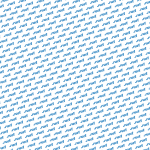Cult spot in the Netherlands: Brouwersdam History - how the Jendrusch family created a windsurfing empire
Julienne Lippertz
· 10.08.2025
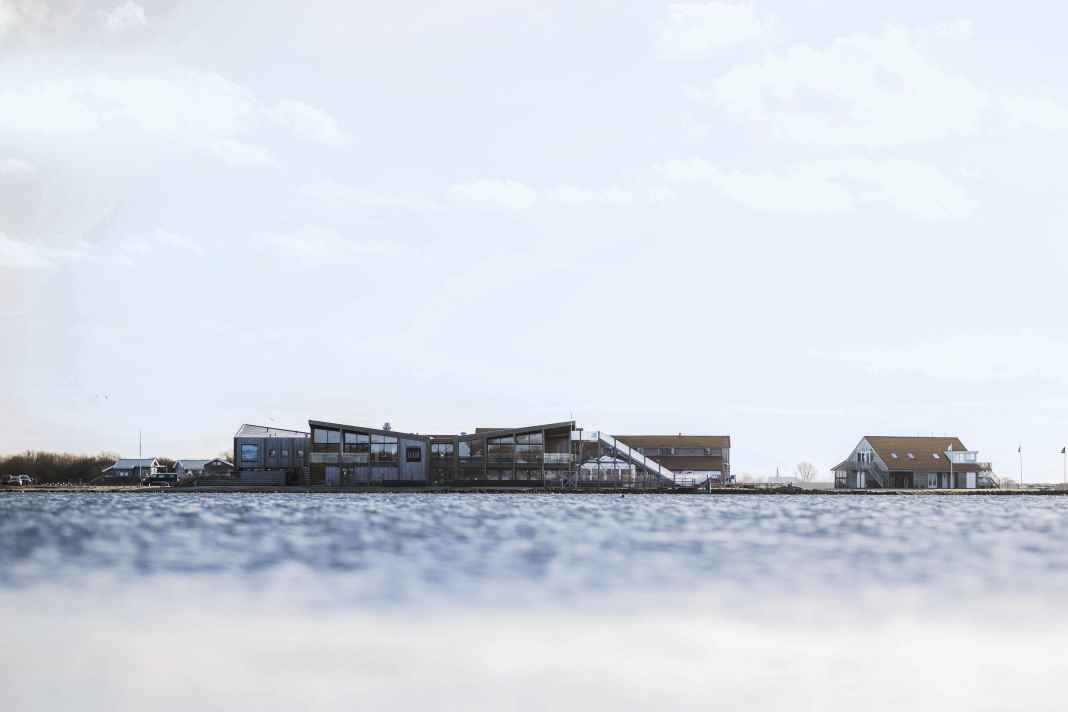





"Anyone can do anything here," summarises Rick Jendrusch. "But we love windsurfing, that was and is always the most important thing," continues the ex-freestyle pro, "if we keep that in mind, then everything else will somehow fall into place." Sounds good, but a little more relaxed than the mighty, spruced-up new centre appears at first glance. For decades, the Zeil- & Surfcentrum on Brouwersdam has been one of the best-known destinations for water sports enthusiasts on the Dutch North Sea coast.
Founded in the 1980s, the centre has developed from a small facility for sailing and windsurfing lessons into a windsurfing empire of sorts with a large shop, restaurant, event space, beach lodges, rental, youth development and much more. But there is more behind the success than just good wind: it is the story of a family that has built up one of the most famous windsurfing spots in the Netherlands with passion, perseverance and a clear vision and now wants to pave the way for the next generation. We spoke to founder Uwe Jendrusch and, in particular, to his now 30-year-old son Rick - himself a windsurfer and the current operator. He gives us an insight into the centre's past, his childhood between surfboards and scullery and how he wants to carry on his father's legacy in the future.
How it all began
"It all started in the water." This is how Uwe's mother described the beginnings of an adventure that was characterised by a passion for water sports. The roots of the surf centre go back to the early 1980s, when Rick's father Uwe, who comes from near Düsseldorf, discovered the spot for himself. Construction of the Kabbelaarsbank began in 1971 to protect the Netherlands from flooding. Two small islands were connected by a dam, creating one of the largest inland saltwater bodies of water in Western Europe: the Grevelingenmeer. Uwe and his brother wanted to pursue the cool, new trend sport of windsurfing and ended up on the Grevelingenmeer. Together with his brother, he now regularly spent weekends and holidays on the Dutch coast, learned to windsurf and not only fell in love with the sport, but also with his future wife, Pieternel van der Linde, who worked at a nearby campsite.
Uwe quickly wanted to move to Holland for Pieternel, but didn't have a job there yet. It was clear to Uwe that he wanted to do something with surfing. So what began as a hobby at weekends quickly took on a more professional character: With an old bus, five boards and hire equipment, Uwe and Pieternel started a mobile surf school right on the shore - initially only on Saturdays and Sundays, as Uwe had to go back to work in Germany during the week. Due to the initial success, they quickly expanded to 40 boards and a small theory school on the upper deck of the double-decker bus. Initially, the courses took place on the left-hand side of the headland, in the area that is now used exclusively for sailing training.

"Het Poeltje" is the ideal learning spot
The part of the spot "het Poeltje" known today for surf training was only added as a training area when the first building was constructed. Even today, the freestylers still have fun in the small shallow water pool when the wind is really good. This area on the Grevelingenmeer quickly proved to be an ideal learning spot. When the municipality was looking for entrepreneurial ideas for a permanent use of the area after the dam was completed, the couple submitted a concept for a centre with a restaurant and a surf school - and received approval.
The first season went very well - it was much busier than expected." (Uwe Jendrusch)
Construction began - not without hurdles, but always with full commitment. They built, extended and adapted the building themselves - often with bureaucratic chicanery, but always with the same passion. At some point, of course, this took more time, so the two of them quit their original jobs and Uwe came to the Netherlands for good in 1989. On 10 April 1993, the first surf centre was opened. At that time it consisted of a reception, a small shop and a catering area. Next to the building was a smaller one with three garage doors, where the equipment was stored and the surf school was run. Bit by bit, the building was extended and the centre became an institution. "The first season went very well - it was much busier than expected!" says Uwe, reminiscing.
Surf hotel and sailing school expand the offer
He quickly realised that they would have to expand by the next season. From then on, they also began organising group and school trips so that the season could last longer. As part of this, the nearby Port Zeelande sailing school was also taken over in 1996, leading to the establishment of the current name of the business: Zeil- & Surfcentrum Brouwersdam. The more group and school trips were attracted to this location, the more accommodation and space was required. This led to the opening of the surf hotel in 1999, an expansion of the shop and an extension of the restaurant. Over time, Uwe and Pieternel slipped more and more into the organisational and administrative areas of the company and the teaching was increasingly taken over by employees, but also by Rick and his brother Tom.
Even if visitors often wonder why they can't camp right by the water: The site is part of the strictly protected Natura 2000 network - so overnight stays are only permitted at designated campsites in the area. This is not a disadvantage for the centre: the preservation of nature and close cooperation with the surrounding accommodation facilities still characterise the sustainable concept of Kabbelaarsbank today. In the recent past, there have been conflicts with a neighbouring holiday park that wanted to build on parts of the starting zones. The windsurfing community reacted in unison - operators, clubs and guests jointly defended the spot.
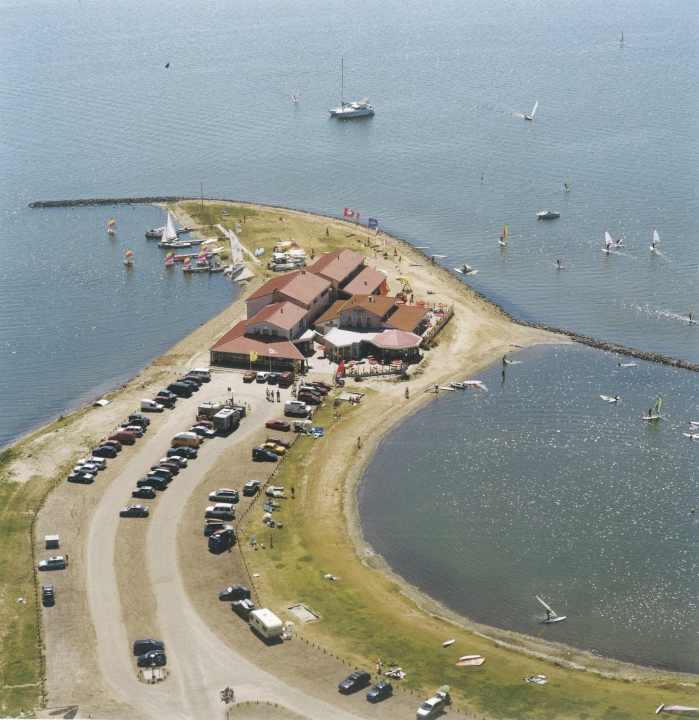
New building, new managing directors at Brouwersdam
It was always clear to the family that their passion was and remains windsurfing, not making a quick buck. In 2016, they realised that the old building was getting on in years and, although there was initially talk of renovation or an extension, a new building quickly became the preferred option. After many discussions with architects, the construction plans were realised in the winter of 2016. And in the following season, the many regular guests as well as new guests are already standing in front of a completely new Zeil & Surf Centre.
On 1 November 2022, Uwe decided that he wanted to retire from the company over time and was delighted to appoint his son Rick as co-owner. Rick had already been involved in the family business as marketing and event manager in previous years and proudly took on his new role. With Rick in the company, Uwe was finally able to retire, but Pieternel did not want to remain active in the company for too much longer either. So a short time later, long-standing team member Dennis van Eijck was asked if he would like to gradually familiarise himself with her role. He accepted the position and that's where we are today.
Uwe is still a silent co-owner, but has now completely retired from active work at the centre and has left it to Rick. "It's hard to say what has been the best thing for me personally over the last thirty years or which moments have remained particularly memorable," says Uwe. "Of course, I think it's great that Rick has decided to join us to continue building the future of the surf centre together. We've done a lot ourselves over the years - I've given countless surf lessons, but I've also built and worked a lot. What I actually find the best thing is that we have achieved all of this together - and how far we have come."
Rick Jendrusch: Growing up in a water sports paradise
"This used to be a huge playground for me," says Rick looking back. Growing up right next to the spot was normal for him, even though he realises that it's not like that for most people. Growing up in a place where many other children spend their holidays may seem surreal to many, but for Rick it was a reality: "I love water sports, I love windsurfing. These days I also go waving a lot, I can also kite or wave ride. But windsurfing is my sport." A typical school day for Rick consisted of going to school in the morning and being taken to the spot by his parents at twelve o'clock for lunch. There he had a sandwich for lunch and then played, sailed, swam or surfed. There was always something to do and the boys working there, who were the "surfer boys" for him, were always cool for Rick. After an hour's break, he went back to school. After school in the afternoon, he went straight back to the "playground".
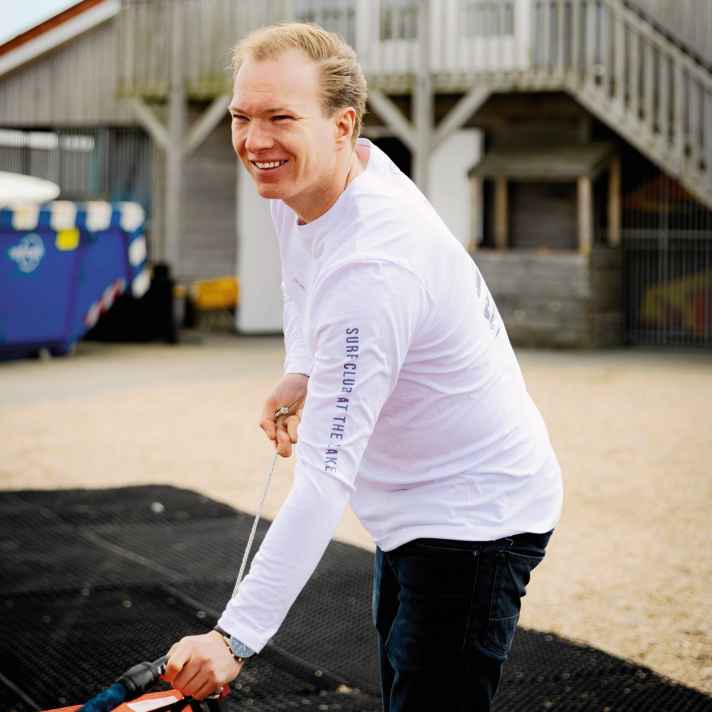
Even as Rick got older, his everyday life still looked like this, except that his mum's taxi became a bike and his focus increasingly turned to windsurfing. So water sports simply became part of his life in the most natural way. His environment in the company was always familiar to him. Long-standing employees already knew him as a baby and at home he always heard everything about the company, so he and his siblings were always part of it. Rick proudly talks about how his parents built up this centre from nothing and now wants to continue to do just as well. However, he is also happy to still have team members at his side who have been working there for 30 years and help him to maintain the company's DNA. Because maintaining the basic concept of his family is Rick's top priority.
This used to be a huge playground for me." (Rick Jendrusch)
The Brouwersdam is a family business
Everything you need for a family holiday is here: "Dad can go windsurfing, the kids can go on the water slide, mum can go shopping and grandma can sit on the terrace. Everyone can stay overnight. Everyone can do everything here." But it was never clear from the start that Rick would take over the company. Rick has worked at the company as a scullery boy since he was 13 and has been involved in almost everything since he was young. His younger siblings Tom and Anna also grew up at the centre, but neither of their interests ever fell in the direction of water sports like Rick's did. Nevertheless, they are also involved in the work. Like Rick, Tom worked in the kitchen alongside surfing lessons and Anna never had to wash up, but proved to be a great help at reception. They each take a different path, but they remain one as a family.
Although he always had the possibility of a takeover in the back of his mind, Rick also lived out his love of windsurfing in the form of a professional freestyle career for a while from the age of 16. For his parents, it was a matter of course that he should also pursue this. "Just do it. You can still work here," they said to him, as Uwe and Pieternel were aware that windsurfing simply belonged to Rick and that he had to make the most of this opportunity. But over the years, the combination of company and sports career became increasingly difficult. Rick realised that he couldn't win if he only put 50 percent into surfing, but that the company wouldn't work either if he only put 50 percent into it. Both need 100 per cent if you want to be successful.
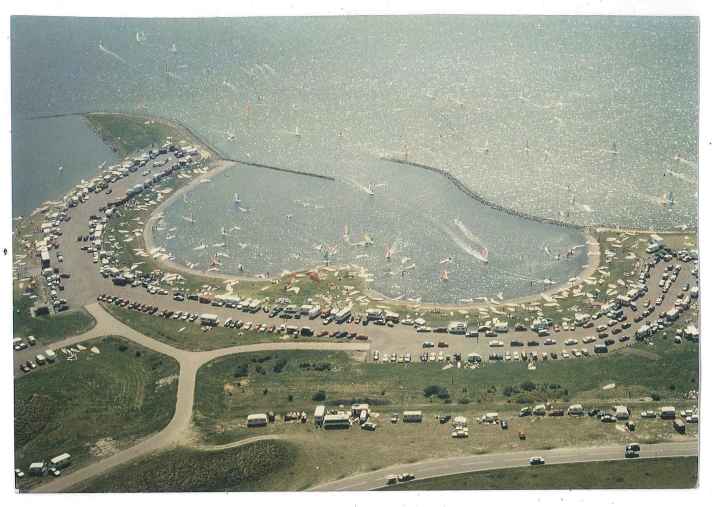
This realisation, says Rick, left him with the question of what to do next. Initially, the decision was made in favour of surfing, as he was aware that he could only pursue this in his younger years. However, following a shoulder injury, Rick missed almost two years of training and at that point he realised that after two years of surfing, he was already too far behind anyway. He had continued to grow in his work at the centre during this time and so it was perfect timing for Rick to put his career on hold and take on bigger roles at the centre. He was aware that this step would come one day anyway as he got older, so it wasn't a sad one for him.
Career end at the homespot
He wanted to continue focussing on water sports, but now simply in a different form. When asked how much he still gets out on the water, Rick simply replies: "Far too little". Although in the course of his story, it quickly becomes clear that perhaps it just doesn't feel like much for him compared to his childhood. He now tends to do short sessions in between. But only when the conditions are really perfect, which is something he is now prepared to do. If it's too cold, he says, he honestly just doesn't feel like it. His big advantage is that his equipment is always already set up right at the spot, so he can be on the water really quickly if he feels like it.
Rick now has a family himself and he says that on a day off he just wants to stay there instead of being back at work somewhere. Because as the head of a company, it doesn't matter whether you have a day off or not, as soon as you're on site, you're automatically working. But on his last trip to Cape Town in winter, he was able to surf a lot and his "little" surfing is usually at least once a week. In 2017, Rick took part in his last competition at the DAM-X and, beautifully, ended his active windsurfing career at his home spot. His goal now is to incorporate fresh perspectives and innovations into the family business while never losing sight of the essentials: windsurfing.
Better a festival than a World Cup
In the past, the surf centre was the stage for major competitions, including the PWA, EFPT and "The Mission" festival. But the focus has shifted. Of course it was cool for the centre to host a World Cup or something similar with lots of top international windsurfers, BBQs and parties, but World Cups are expensive and difficult to organise, Rick tells us. "Watching eight hours of freestyle? Hardly anyone can do that." People do like to come and watch a competition like this, but never on such a scale that it would ultimately be worthwhile for the company.
An event in which everyone could take part and find their own challenge was the logical idea. And so the current format of the DAM-X events was born in 2015. The focus: see, participate, experience. Instead of elite competitions, the focus is on participation and enjoyment. After a three-year coronavirus break, the DAM-X returned in a smaller format in 2023 and inspired participants once again. In the future, Rick would also like to focus on the community rather than more serious competitions at the spot. Rick clearly shows that his plans for the future are focussed on youth development in windsurfing. With the rookie class, kids' courses and targeted support for women, the family wants to offer access to the community for everyone.
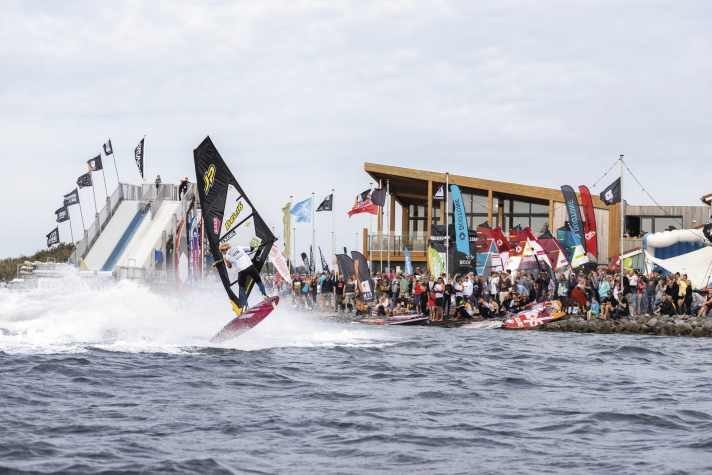
Equipment hire with maximum flexibility
However, Rick also explains that it is becoming increasingly difficult to keep people interested. Especially with social media, people always want to do everything once. One day of windsurfing, one day of wingsurfing and then a bike tour on top of that. The main thing is to have as much to post as possible. And the surf centre also notices this in its bookings. The real four-day courses are stagnating and the number of taster courses is increasing. But how do you keep customers interested in the sport? You make the hire service more attractive. Because people's desire to pursue more and more leisure activities also means that they are buying less and less of their own equipment and renting more. This greatly benefits the centre's annual pass system.
"Windsurfing is actually a shit sport," says Rick, referring to all the effort you have to put in to get out on the water with your own equipment. It's not just the costs that play a role here, but also the time required to set up and take down the equipment and the maintenance, storage and much more. Just like at the gym, you can get an annual pass and experience all the benefits that a rick enjoys. The equipment is already set up, so all you have to do is get changed and off you go on the water. The sail size doesn't fit? No problem, after two minutes you already have another sail in your hand. After the session, you can take a stress-free shower, change and simply drive home in your clean car.
Zeil- & Surfcentrum Brouwersdam: More than just a surf school
And even those who don't necessarily want to tie themselves to one spot with such an annual pass have an advantage here. Because if you just want to surf over on the North Sea side of the dam, that's no problem. You can pack your hire equipment, go over there and bring it back later. This means that variation is no longer an issue. The equipment is constantly maintained and renewed every year. So if you are ever interested in your own equipment, you can also look around the pool of used boards for your own, as the equipment goes on sale after one season. Rick sees the future in this system. "Why should you buy your own equipment when you have everything here? The downside, of course, is that you can only get the equipment during our opening hours," he adds with a grin.
Being able to say at school: My sport is windsurfing - that's important." (Rick Jendrusch)
Today, the Zeil- & Surfcentrum Brouwersdam is more than just a surf school. It is a family business, an institution, a meeting point for the European windsurfing community, a gathering place for numerous freestyle World Cup professionals and a place that is constantly evolving. However, further reorganisation is not on the agenda for the time being. Rick Jendrusch runs the company with the same passion as his father and mother - a family that lives for water sports and the community. In 30 years, a small mobile surf school has become a comprehensive leisure and water sports centre that has developed into an anchor point on the Brouwersdam through innovation, passion and community spirit.
